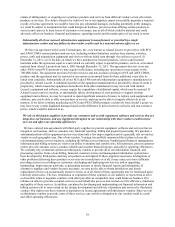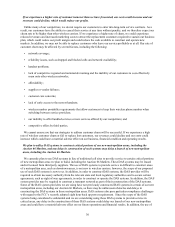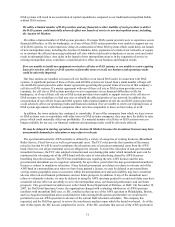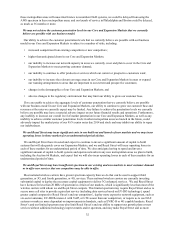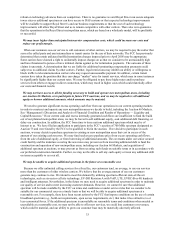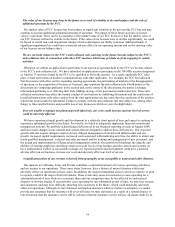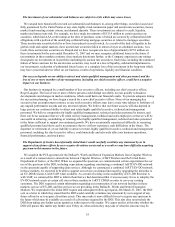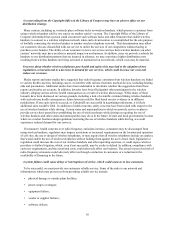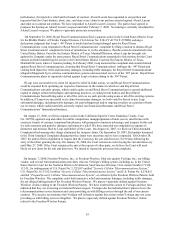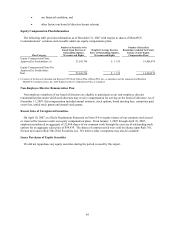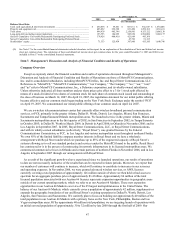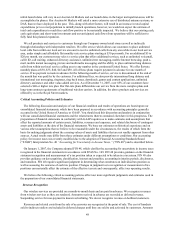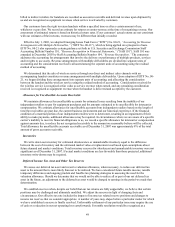Metro PCS 2007 Annual Report Download - page 50
Download and view the complete annual report
Please find page 50 of the 2007 Metro PCS annual report below. You can navigate through the pages in the report by either clicking on the pages listed below, or by using the keyword search tool below to find specific information within the annual report.39
We are subject to numerous surcharges and fees from federal, state and local governments, and the
applicability and amount of these fees is subject to great uncertainty and may prove to be material to our
financial results.
Telecommunications providers pay a variety of surcharges and fees on their gross revenues from interstate and
intrastate services, including federal Universal Service Fund fees and common carrier regulatory fees. The division
of our services between interstate services and intrastate services, including the divisions associated with the federal
Universal Services Fund fees, is a matter of interpretation and may in the future be contested by the FCC or state
authorities. The Federal government and many states also apply transaction-based taxes to sales of our products and
services and to our purchases of telecommunications services from various carriers. In addition, state regulators and
local governments have imposed and may continue to impose surcharges, taxes and fees on our services and the
applicability of these surcharges and fees to our services is uncertain in many cases and jurisdictions may argue as to
whether we have correctly assessed and remitted those monies. Periodically state and federal regulators may
increase or change the surcharges and fees we currently pay. In some instances we pass through these charges to our
customers. However, Congress, the FCC, state regulatory agencies or state legislatures also may preclude our
ability to pass through transaction based tax liabilities, regulatory surcharges and regulatory fees imposed on us to
our customers. We may or may not be able to recover some or all of those taxes from our customers and the amount
of taxes may deter demand for our services or increase our cost to provide service which could have a material
adverse effect in our business, results of operation or financial results.
Spectrum for which we have been granted licenses as a result of AWS Auction 66 is subject to certain legal
challenges, which may ultimately result in the FCC revoking our licenses.
We have paid the full purchase price of approximately $1.4 billion to the FCC for the licenses we were granted as
a result of Auction 66, even though there are ongoing uncertainties regarding some aspects of the final auction rules
as it relates to DE participation in the auction. Several interested parties filed an appeal in the U.S. Court of Appeals
for the Third Circuit on June 7, 2006, of the DE auction rules seeking to overturn the results of Auction 66. On
September 28, 2007, the Court dismissed the case. The petitioners filed a petition for reconsideration of the court’ s
order which has been denied. We do not know whether the parties will further appeal the Court’ s ruling and we are
unable at this time to predict the likely outcome of any further court action. If the court overturns the results of
Auction 66, we could lose our Auction 66 Market licenses, we would not be reimbursed for our efforts to clear or
build the spectrum, but we could receive a refund of our auction amounts. In addition, there could be a delay in us
receiving a refund of our payments until the appeal is final. In such instance, we may be forced to pay interest on the
payments made to the FCC without receiving any interest on such payments from the FCC. If the results of Auction
66 were overturned and we receive a refund, the delay in the return of our money, the interest we would have
incurred without reimbursement, the loss of any amounts spent to develop the licenses in the interim, and the loss of
the ability to provide service in the Auction 66 Markets, may materially and adversely affect our financial results
and our business plan.
The requirements of the FCC Order Implementing the Independent Panel on Hurricane Katrina may have a
material financial or operational impact on our financial results and operations.
The FCC has recently adopted a requirement that wireless carriers maintain emergency back-up power for a
minimum of twenty-four hours for assets that are normally powered from local commercial power and located inside
mobile switching offices, and eight hours for assets that are normally powered from local commercial power and at
other locations, including cell sites and DAS nodes. The back-up power requirement has not yet taken effect, and the
date on which it will take effect is uncertain. When the rule takes effect, we will not be required to comply with
these minimum backup power requirements where we can demonstrate that such compliance is precluded by certain
exceptions. To the extent we are required to comply with these requirements, we may find it necessary to file a
waiver with the FCC seeking relief from these requirements or additional time to comply. We can give no assurance
that the FCC will grant any such relief. If we are required to comply with these requirements we may have to
purchase additional equipment, spend additional capital, seek and receive additional state and local permits,
authorizations and approvals, and incur additional operating expenses and such costs could be material. In addition,
we may be unable to comply with these requirements and we could be forced to cease operations from some
locations or be subject to fines and forfeitures and other adverse licensing actions from the FCC. Further, the
requirement to install these back up power facilities could also adversely affect our operations by distracting
management and engineering resources from the maintenance and growth of our existing networks or new
metropolitan areas, such as the Auction 66 Markets, which could have a material adverse impact on our operations
and delay a launch of service in such areas. Finally, a material failure to comply with these requirements may limit


